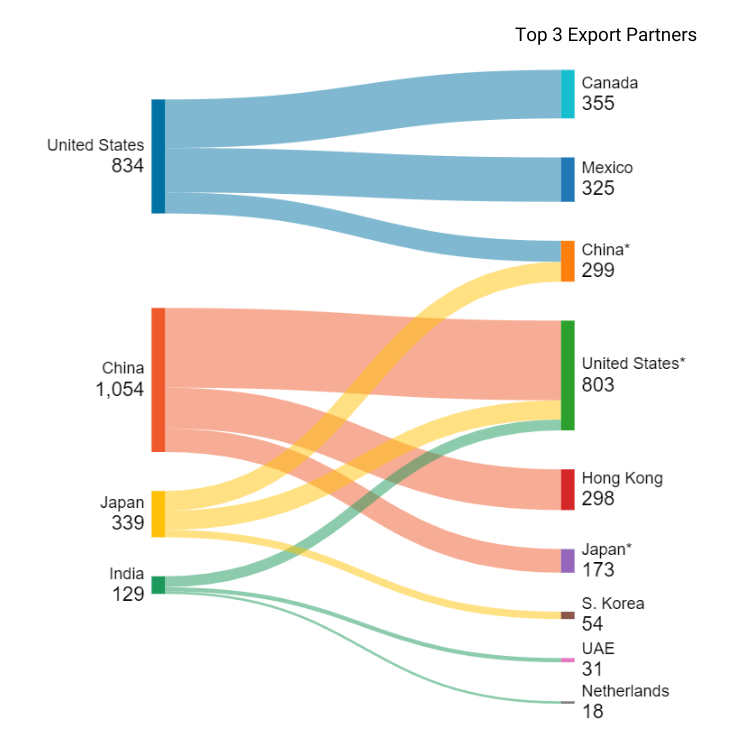Why is investing in Asia important for global investors?
The opportunity set in Asia is immense: Asia is home to over half of the global population, a third of global growth, a third of global exports, a quarter of global consumption, over a third of global savings, and five of the ten largest equity markets, according to JP Morgan’s market insights.
Further, referencing IMF’s datasets, the three largest economies in Asia based on GDP are China, Japan and India. Collectively, their GDP is 92% of that of the United States, the country with the largest share of world’s GDP. The average GDP growth rate of the three economies combined is north of 4%.
If the current real GDP growth rates persist for the next decade, the top three Asian economies will nearly equal the United States GDP in five years and surpass it by 9.5% by 2034.
| April 2024 GDP
(USD trillions) |
% Real GDP Growth | 2029 Estimated GDP (USD trillions) | |
| Top 3 Asian Economies | 26.6 | 4.3% | 32.8 |
| United States | 28.8 | 2.7% | 33.0 |
Based on data from UNCTAD, the top three trading partners for the US and the top three economies in Asia reveal two stories: export dependencies for some and uncorrelated export partners for others.

Other factors such as age of the demographics, domestic consumption, the expansion of the middle class, high savings-to-GDP ratios, and urbanization are key drivers of the GDP growth in these economies.
What are portfolio construction considerations when investing in Asia?
We highlight several factors that allocators should consider when constructing a portfolio with exposure to Asia:
- Allocation and Risk Minimization: Determine your percentage allocation to the region and to individual countries to minimize idiosyncratic risk. Assess your investment relative to the GDP growth of the country and total Foreign Direct Investment (FDI) in the country.
- Investment Themes: Identify the factors and themes that are important for your portfolio. Are you betting on high growth in domestic consumption, seeking exposure to companies with global operations, or looking to capitalize on digitalization trends? Answers to these questions will help shape your investment strategy in Asia.
- Investment Horizon: Consider the term of your investment. Are you willing to invest for the long term? Or is this a tactical bet? This would help choose how you execute the investment.
- Investment Execution: Determine the best mode of executing your investment views. Options include mutual funds for accessing public markets, direct investments for those with internal expertise, and alternative investment funds (AIFs), which are rapidly growing in the region. For instance, India has seen significant growth in AIFs over the past five years.
What are global investor sentiments on investing in Asia?
According to Nikkei Asia analysis of Preqin data, $5 billion is earmarked for Japan out of a total of $14.8 billion raised for private equity investment in the Asia-Pacific region in the April to June quarter. Meanwhile, $6.9 billion was set aside for diversified investment across the region.
While this blog focuses on the top economics in Asia by GDP, S. Korea, Taiwan, South East Asia collectively add to the allure of investing in Asia.
Due diligence considerations when investing in Asian economics:
While the return potential story is compelling, investing in Asia presents a new challenge for investors with unique due diligence considerations.
- Cultural Differences and Language Barriers: Understand local culture and business practices to build successful partnerships and navigate the investment landscape.
- Regulatory Considerations: Conduct due diligence on current and anticipated regulatory requirements, especially in the context of the country of investment. Given the heterogeneous nature of regulations of each country, different accounting standards, political risks, and economic policies can impact investment outcomes.
- Human Rights Diligence: Evaluate the human rights practices of investments, particularly in regions where labor laws may differ from global standards. Key frameworks to reference include Australian Modern Slavery Act, PRI goals, and the Equator Principles, especially for project finance investments.
- ESG Considerations: This is a critical diligence area, especially with factors around impact benefits as well as minimizing carbon footprint.
- Government Administration: The rapid pace of growth and the nature of these economies mean there is a high degree of dependency on policies and growth agenda of the government. As a result, the stability and effectiveness of government administration is a key diligence area, as policies on trade, taxation, and foreign investment can vary widely and affect business operations and profitability.
- Valuation and Liquidity Factors: Foreign securities often present higher volatility, pricing challenges, and liquidity issues compared to U.S. securities. Carefully evaluate exit strategies and liquidity options, especially for non-publicly traded investments.
- Transparency and Reporting: Ensure agreement around the need for clear, consistent, and reliable financial and operational information to mitigate risks associated with misinformation or fraud, especially in certain emerging markets.
- Other Considerations: such as the United States 2023 Treasury Executive Order that established a new Outbound Investment Program (“OIP”) to prohibit certain outbound US investments to China (including Hong Kong and Macau) in several technology sectors relevant to military, intelligence, surveillance, or cyber-enabled capabilities. The EO also requires notification of other outbound investments to China in these sectors.
Join us at our upcoming webinars on investing in Asia to explore these considerations. Register here – https://us02web.zoom.us/webinar/register/8317229879129/WN_WWEAEfNTS3CtJ-mjHlgttQ



